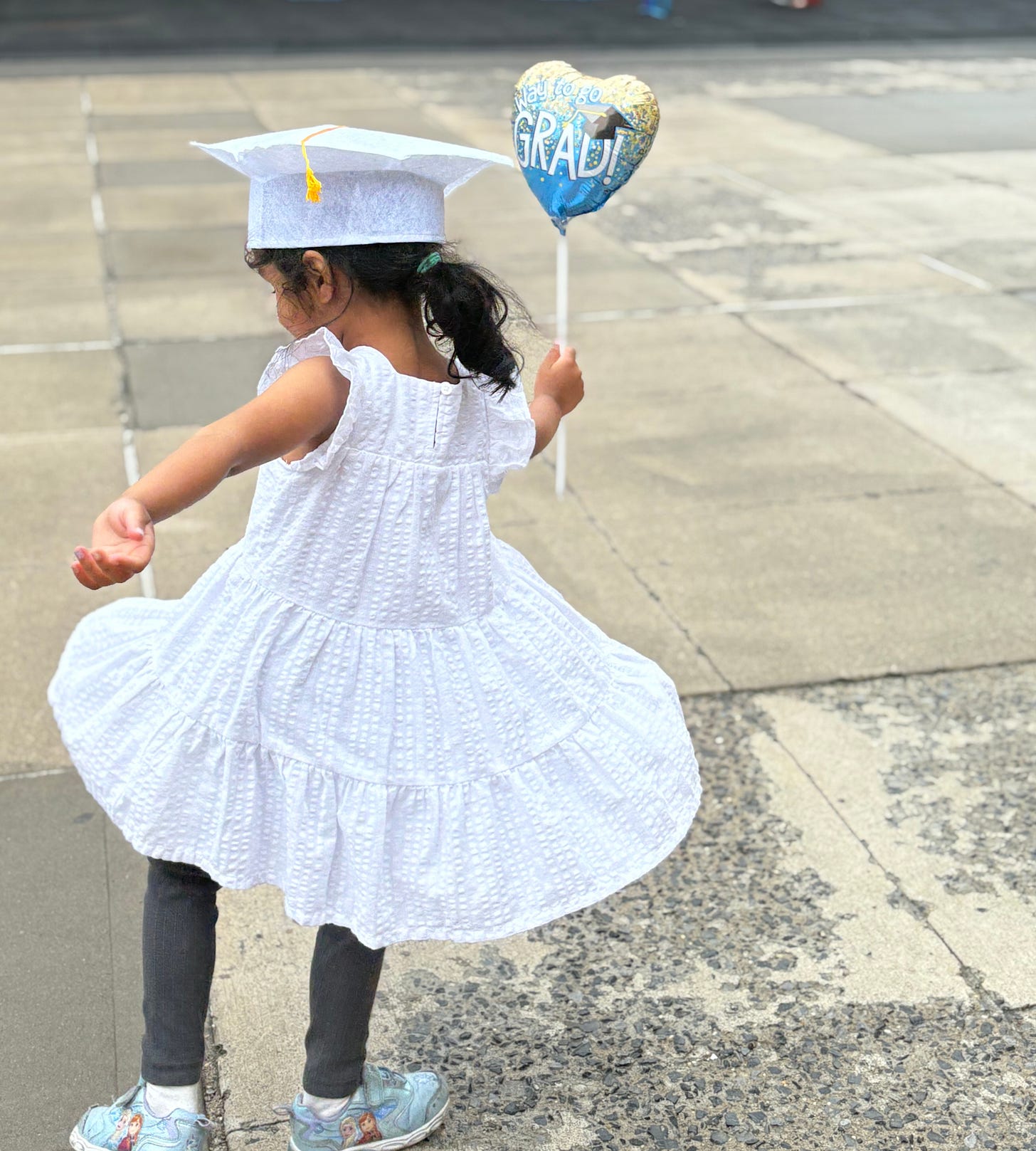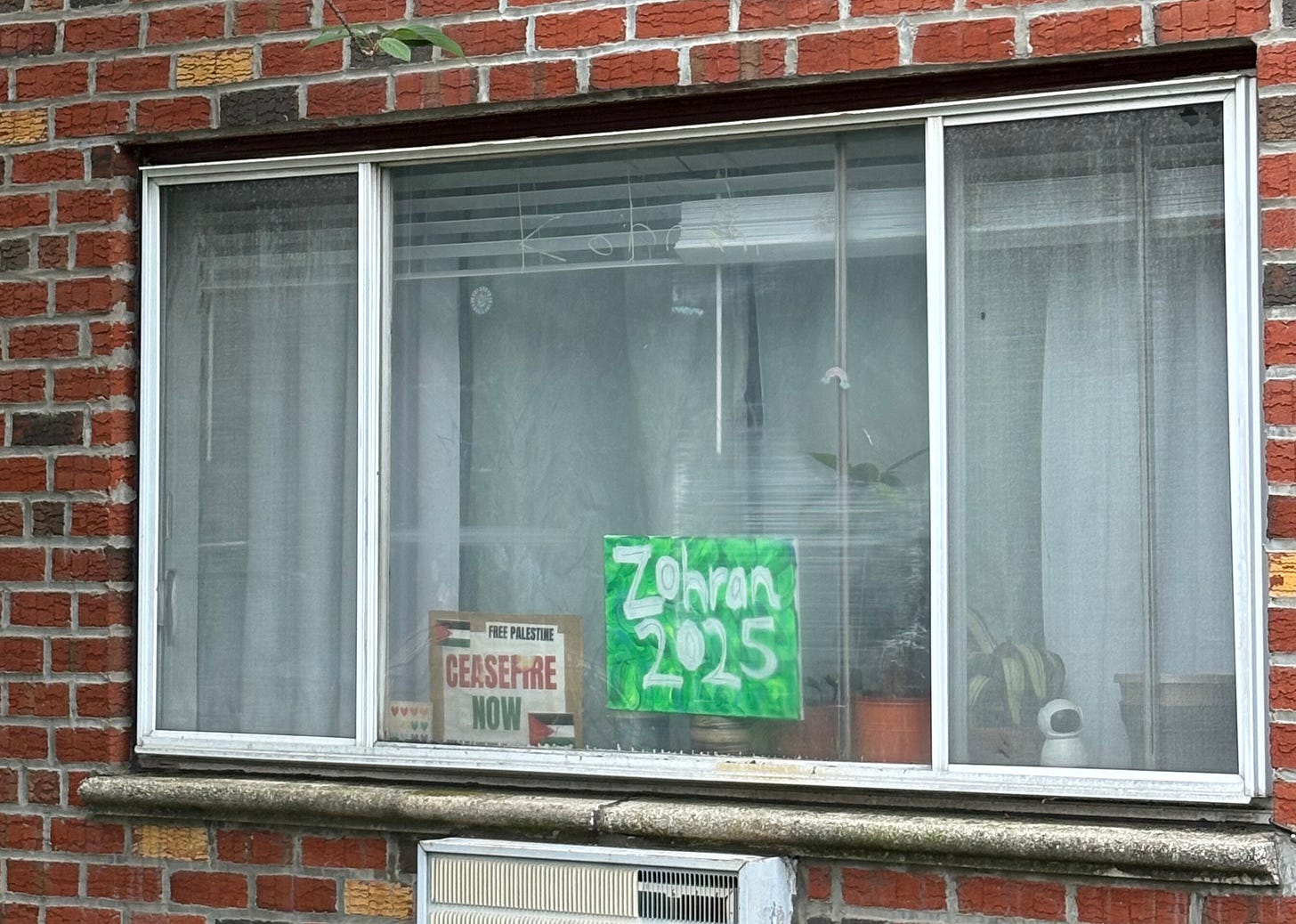Mulling over the promise of Zohran Mamdani in Trump’s America at my daughter's Pre-K graduation
Where my daughter’s joy meets my immigrant ache—and why Zohran Mamdani gives me hope.
The microphone let out a small shriek before the principal approached the podium and welcomed us to the pre-K step-up ceremony. I held my phone steady, zooming in on my daughter’s heart-shaped face as she mouthed the words to the school song. She stood in a neat row of small bodies, their voices wavering and wide-eyed, their arms rising in clumsy unison. I recognized the melody. I had once sung the same song on this same stage, decades earlier.
But I had never imagined this moment—at least not like this. The brown daughter of a brown mother standing in the glow of something I had long longed for as a first-generation American—tradition, continuity, legacy.
Growing up, I devoured sitcoms about white suburban life—Full House, Boy Meets World, 7th Heaven—stories where generations stayed in the same zip code, attended the same schools, ran into their old gym teachers at the grocery store. Later, in the magazine world as a budding writer, I met real-life versions of these characters—people who were so excited to move to New York City and leave their legacies behind—gentrifying and driving up rental prices in the boroughs where working class immigrant families like mine survived.
I envied them.
I was the first U.S.-born child in my extended family. My cousin followed six months later, but I was first. There was no sepia-toned photo celebrating our relatives’ achievements hanging in a school hallway. My parents’ schools existed in stories or on documents tucked inside manila folders we kept ready in case immigration ever came knocking.
I grew up in peak Greek Astoria in the 80s and 90s which a 1991 New York Times article described as “like being in Athens.” By then, Bangladeshi immigrants had also begun to settle quietly into Astoria. My parents arrived in 1983. We lived in a cramped two-bedroom apartment in Astoria, Queens, in the shadow of car repair shops and Greek bakeries until I was fourteen and my parents bought their first home a few blocks away.
Here I am now, raising my daughter in the same neighborhood, where biryani and lavender lattes now coexist. It’s a neighborhood transformed—not just by real estate, but by presence, by people who look and sound like us stepping into roles we once thought were off-limits.
My daughter’s first teacher was a young Bengali woman—soft-spoken, bright, and confident—the kind of figure I never saw in authority growing up. The school crossing guard, too, feels familiar. She has the same jovial energy as the blonde woman from my childhood who inspired my sister’s first career aspiration of becoming a police officer, but now she wears a navy blue hijab and speaks to the kids in Bangla and English and hands out gift bags on Eid. Across the Brooklyn-Queens Expressway, we have our first Bangladeshi-American Muslim councilwoman, Shahana Hanif—a friend and community advocate.
Representation can feel like a cliché when it’s used to sell products or diversity metrics. But here, it’s something else. It’s tender. It’s local. It’s real.
The country beyond Queens feels like it’s sliding backward. Since returning to the White House, Trump has wasted no time reviving old promises and inventing new threats. He’s ordered ICE raids in sanctuary cities. He’s exploring ways to revoke birthright citizenship—targeting people like me, the children of undocumented immigrants. He’s dismantled what little DEI infrastructure remained, declared war on how public schools teach race and history, and is now flirting with authoritarian prosecutions under vague anti-sedition laws.
But here in New York, something else is happening—something radical and fragile.
Among the frontrunners in this year’s mayoral race is a thirty-three-year-old democratic socialist and the son of acclaimed Indian filmmaker Mira Nair and reknowned political scientist and Columbia University professor Mahmood Mamdani. He’s served as a New York State Assemblymember since 2021, representing parts of Astoria. He’s one of only a handful of South Asian elected officials in New York, and among the few who unapologetically center immigrant rights, housing justice, and the working class. Now, as he mounts a historic run for mayor in a city where our communities have long been courted but rarely centered, Mamdani offers something rare: not just representation, but real political imagination.
I don’t know if Zohran will win. He’s certainly not a perfect candidate. And yes, he is not without privilege. Good, I say, use it with intention.
But the most important thing of all: he’s the promise of something new.
Kamala Harris once held that promise too. Her mixed heritage—Black and South Asian—felt revolutionary, until it didn’t. Her historic ascent brought pride, but not transformation. She entered the room but didn’t change it. We lost her to the machinery of politics. Or maybe she was never really ours to begin with.
Zohran doesn’t move like a typical politician. He weaves Bollywood nostalgia into campaign messaging, and his wedding photoshoot on the subway is peak New York City. He canvasses like it’s sacred work. He’s not interested in contorting himself to fit the mold. His politics are unruly, intersectional, urgent. And not every South Asian is rooting for him. Just yesterday, an auntie from the community posted a pro-Andrew Cuomo plea on Facebook, and the comment thread laid bare just how divided we are. Politics doesn’t always translate to solidarity—especially in immigrant communities shaped by survival.
Frederick Joseph writes, “His campaign does not exist in isolation. It is the latest node in a longer continuum of resistance and reinvention. Much like Harold Washington in Chicago, whose mayoral seat marked not only a political realignment but a moral one, or Bernie Sanders in Burlington, who showed that socialist governance was not fantasy but framework, Zohran stands as a rebuke to the old lies and a blueprint for new truths.”
Zohran feels like an opening.
As I sat in that auditorium, watching my daughter sing the school song I once sang, I felt something I had never allowed myself to feel fully before: belonging. Not theoretical, not aspirational. But real. Inherited. Rooted.
My daughter is nothing like I was at her age. She’s confident, social, a tiny diva with a gravitational pull. She went up on that stage to accept her preschool diploma with a thousand times the confidence I did decades ago. She moves through the world as if she belongs—because she does.
She might go to the same high school as me and Zohran. She might run for office someday—and win—and not have to be the first in her community to do so. She might become the third generation of homeowners in Astoria, Queens. And she might take all of it for granted.
And isn’t that the goal?




And she clapped for herself and others while accepting that Diploma.
Yes! Beautiful 💜✊🏽❤️